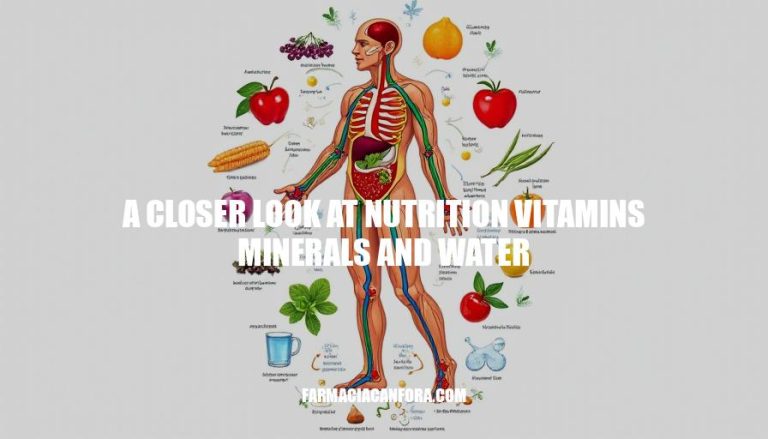


Vitamins, minerals, and water are all crucial for our bodies to work properly. Vitamins help us have energy, fight off infections, and repair damaged cells. Minerals, which come from the earth, keep our bones strong, help our nerves function correctly, and support chemical reactions in our body.
Water is essential for keeping our cells hydrated, regulating our body temperature, and getting rid of waste. Together, they give us the foundation we need to stay healthy and feel good.
Vitamins are indispensable in the intricate web of biochemical reactions within the human body. Acting as catalysts, they facilitate essential enzymatic processes that would otherwise proceed at an insufficient rate to sustain life. For example, Vitamin C (ascorbic acid) plays a pivotal role in collagen synthesis, aiding in wound healing and maintaining the integrity of connective tissues.
Similarly, B-vitamins, like B12 and B6, are integral to energy metabolism, helping convert nutrients into usable energy and supporting neural function through neurotransmitter synthesis.
Minerals contribute structurally and functionally to physiological systems. Calcium, for instance, is a cornerstone of bone and tooth formation, ensuring structural integrity, while also playing a dynamic role in muscle contraction and nerve signaling. Iron is another critical mineral, essential for forming hemoglobin in red blood cells, enabling oxygen transport throughout the body.
On a functional level, trace minerals like zinc support enzymatic activity and immune responses, while magnesium aids in over 300 biochemical reactions, including DNA replication and protein synthesis.
Water serves as a medium for nearly every physiological process. It ensures the efficient transport of nutrients such as glucose and amino acids through the bloodstream to cells. Concurrently, it facilitates the removal of metabolic waste products like urea and carbon dioxide, maintaining homeostasis.
Beyond its transport and elimination functions, water regulates body temperature, provides cellular turgor, and supports biochemical reactions by acting as a solvent for ions and molecules critical to cellular processes.
These components—vitamins, minerals, and water—work synergistically to maintain the body’s intricate balance, underscoring the interconnectedness of nutrition and health.
They work together to provide energy, fight off infections, repair damaged cells, and maintain overall well-being. Vitamins act as catalysts for essential biochemical reactions, while minerals contribute structurally and functionally to physiological systems. Water is crucial for transporting nutrients, removing waste products, regulating body temperature, and supporting cellular processes.
These components are interconnected and interdependent, making informed dietary choices essential for maintaining a healthy balance. By consuming a balanced diet rich in vitamins, minerals, and water, individuals can support their body’s needs and promote optimal health. This includes choosing whole foods, such as fruits, vegetables, whole grains, lean proteins, and healthy fats, which provide the necessary nutrients for proper bodily functions.
In addition to a well-balanced diet, staying hydrated by drinking plenty of water is also crucial. Adequate hydration helps maintain cellular function, supports energy production, and aids in waste removal. By prioritizing vitamins, minerals, and water in their daily lives, individuals can take proactive steps towards maintaining their overall health and well-being.